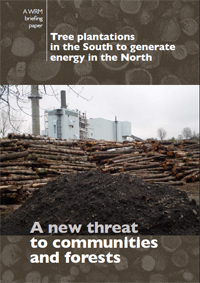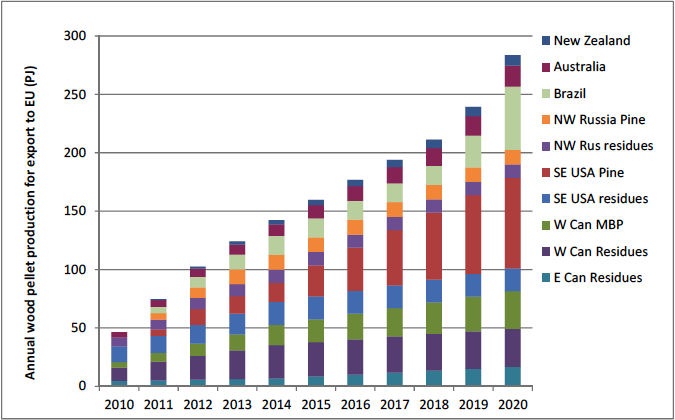
By Winnie Overbeek.
Some years ago, a Dutch consultant approached the World Rainforest Movement to give comments on an idea. On behalf of his government, he was researching the viability of implementing large-scale tree plantations in Northeastern Brazil to produce wood from plantations of so-called “fastwood” trees like eucalyptus. After harvesting, these would be transformed into small pieces called “pellets”. Finally, these would be shipped to Europe to be burnt for heat or electricity generation. The Dutch government had information that Northeastern Brazil had plenty of uninhabited fertile lands! Or so they dreamt.
In times of a climate crisis, European governments and their corporate energy producers need cheap energy options that can be classified as “renewable energy”. Due to renewable energy targets in the EU, Western European demand for pellets will probably triple from 11 Mt per year in 2010 to 35 Mt per year by 2020. Europe also wants to maintain the highly centralized and profitable form of energy production. New industrial tree plantations in the global South seem to be an excellent option. With these plantations you are able to produce a homogenous raw material that you can easily ship and trade around the world, a real “commodity”. Large-scale industrial tree plantations can also count on lots of state support in the global South – under the promise of creating jobs and bringing “progress” and “development”. With the help of these governments, you can often get lands for free and if you need to buy them, you can get them for a better price than in the North. Salary levels are also relatively low in the South and you can take advantage of the current trend of easing the labor legislation in many countries. And the trees grow much faster than in the North. They are even considered a “forest” by the United Nations Food and Agriculture Organization (FAO).
However, as the Ejolt report “An Overview of Industrial Tree plantations in the Global South” shows, the reality is completely different. Consider for example the many false promises related to the quantity and quality of jobs created. Consider the reality of the presence of communities on the fertile lands that are targeted by plantations companies. Just look at the conflicts between companies and communities all around the world where plantations have been set up, especially around land ownership and land access. The new trend of woody biomass plantations will only aggravate this situation of increasing social and environmental injustice. From a Southern perspective, this is a step back to the colonialism period that they hoped would be part of history: the South fulfilling its primary role of providing raw materials for the benefit of the North, occupying vast territories and expelling communities in the South, while leaving some benefits for local elites.
At present, most of the wood Europe burns for energy purposes comes from Europe itself and from Northern America, especially from the South of the USA. But increasingly, projects are being implemented in the global South by corporate actors for the aforementioned attractive reasons. See the rise of Brazil in the EU’s demand for pellets:
The World Rainforest Movement (WRM) is launching this week a briefing document on this new trend, making an overview of the increasing demand in Europe for woody biomass, as well as the different projects that have come up in all of the three Southern continents (see).
It seems that the fundamental problem behind this trend is the current unsustainable energy consumption that benefits a minority of humanity. The trend is stimulated by private investors, who make huge profits from this production and consumption model. Given all the negative impacts of industrial tree plantation on communities in the global South, these communities would be much better off if the governments of Northern countries would start to solve their energy consumption problem with sources available in their own territories. That would require a lot of really good ideas, not crazy ones that keep exploiting the South for the benefit of the North.
Winnie Overbeek
International Coordinator of the World Rainforest Movement (WRM)


The project ENVJUSTICE has received funding from the European Research Council (ERC) under the European Union’s Horizon 2020 research and innovation programme (grant agreement No. 695446)